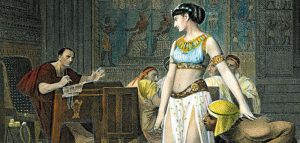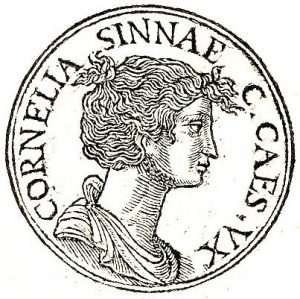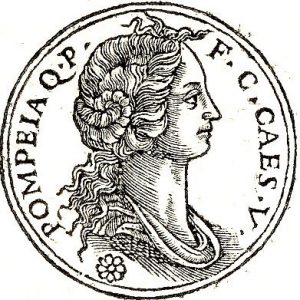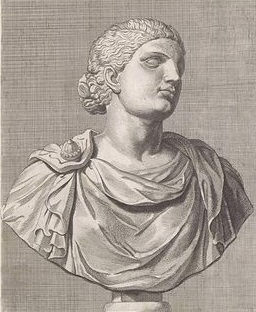Julius Caesar had three wives: Cornelia, Pompeia, and Calpurnia. He married Cornelia in 84 BC. After her death in 67 BC, Caesar then married Pompeia, the daughter of general Sulla, in 62 BC. Suspecting that she was unfaithful, he divorced Pompeia and wed Calpurnia in 59 BC. They remained married until his death, although Caesar also had a lover in Cleopatra VII, the queen of Egypt, during his last marriage.
The book The Women of Caesar’s Family by Monroe E. Deutsch describes Caesar’s marriage to Cossutia before Cornelia, although modern historians widely dispute this fact. She was chosen by Caesar’s father but Caesar allegedly divorced her soon after his father’s death. Plutarch mentioned Cossutia as one of Caesar’s wives but did not mention anything further about her. Marie-Nicolas Bouillet, a French author, lists only Cornelia, Pompeia, and Calpurnia as his wives.
Cornelia
In 84 BC, Caesar married Cornelia due to her patrician status in the traditional patrician form of marriage, which was called confarreatio. Cornelia was the daughter of the respected Lucius Cornelius Cinna, a man with a record of being consul four times during the Roman Republic. The year after their marriage, Cornelia gave birth to Julia, Caesar’s only legitimate biological daughter.
Although the affection the couple had for one another has not been documented, Caesar showed his loyalty upon refusing to divorce his wife. Lucius Cornelius Sulla, a Roman general who had become a dictator of the Roman Republic during 82 BC or early 81 BC, was the rival of Cinna, Cornelia’s father. At Sulla’s command, many had been forced to divorce their wives and marry members of his family. The Roman senator Marcus Piso who had married Cinna’s widow was encouraged to divorce his wife, and he followed Sulla’s orders. General Pompey was also pushed to divorce his wife in favor of Sulla’s step-daughter. Likewise, Caesar was urged to divorce Cornelia and marry Sulla’s daughter. In an act of loyalty or defiance, Caesar chose to escape Rome. His titles, family inheritance, and dowry were taken away, and Sulla’s men were sent to kill Caesar. He was caught at some point but bribed the officer who was to kill him. With the help of influential people around Sulla and a few Vestal Virgins, Caesar was able to return to Rome and Cornelia after some time.
Cornelia was Caesar’s wife and head of the household until she died in 68 BC, leaving behind their 16-year-old daughter Julia. This happened during the year that Caesar achieved quaestorship. Her death was honored alongside Marius’ widow, Julia. Caesar gave them both eulogies from the rostrum, the platform for public orators in Rome. This act was not often done for the deaths of young women, which marked the uniqueness of the speeches for Cornelia and Julia.
Pompeia
Pompeia was the granddaughter of Sulla. She and Caesar married in 67 BC after the death of Cornelia. The Women of Caesar’s Family discussed the possible political motivation behind this union, considering Sulla’s power at the time.
When the couple was married, Caesar was the “pontifex Maximus” or chief priest of the state government. This meant that Pompeia was to carry out her role in the rites of Bona Dea, which were held at night and supposedly celebrated by female priestesses and other female members. There was music, dance, and wine during the event. In 62 BC, a scandal broke out about a suspected male infiltrating the event disguised as a woman. His name was Clodius, and he was rumored to be in love with Pompeia. Caesar caught wind of the incident and rumors of his wife’s faithfulness, leading him to divorce her.
Calpurnia
Caesar took a third wife while he was a consul in 59 BC. She was a teenager named Calpurnia. Her father, Lucius Calpurnius Piso Caesoninus, was a consul in 58 BC. All accounts describe her as faithful, good-natured, and humble. Despite Caesar’s infidelity during their marriage, she stayed loyal to him. She stayed with him until his assassination. Afterwhich, she had all of Caesar’s important possessions and documents delivered to Mark Antony, one of Caesar’s greatest supporters.



